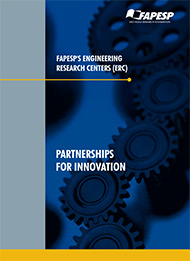Genomics for Climate Change Research Center (GCCRC)

Genomics for Climate Change Research Center (GCCRC)
Goal: To develop biotechnological solutions, using gene editing and plant-associated microbiomes, to ensure agriculture sustainability to face the threat of global climate change
Coordinator: Paulo Arruda
Host Institution: Center for Molecular Biology and Genetic Engineering, State University of Campinas (CBMEG-UNICAMP)
Business partner: Brazilian Agricultural Research Company (Embrapa)
www.gccrc.unicamp.br
+55 19 3521-2933
+55 19 3521 1117
gccrc@unicamp.br
FAPESP Process 2016/23218-0
Term: Aug 2018 to Jul 20
FAPESP and EMBRAPA have been partners in the Genomics for Climate Change Research Center (GCCRC) at the University of Campinas since 2017. The center develops biotechnological solutions to increase plant resistance to drought and heat. The technologies developed by GCCRC will be made available to the agribusiness sector for trait development and commercial use.
GCCRC uses biotechnological tools such as genetics, genomics gene targeting, genetic engineering, genome editing and microbiome assessment, organized in a robust pipeline, to improve crop performance under abiotic stress due to climate change.
The research program is built on a platform called “From Gene to Trait”, which uses modern bioinformatics and computational tools to interrogate omics data from various sources in search of novel genes, pathways and microbes to develop biotechnology traits. To understand in greater depth the functional role of genes and microbes in plant performance under abiotic stress, GCCRC has developed in-house tools for real-time advanced plant phenotyping, allowing assessment of plant abiotic stress responses in both greenhouses and field trials.
The physiological parameters for evaluating drought stress tolerance are validated by high-resolution data and imaging. The advanced laboratory has light/temperature-controlled growth rooms designed for maize transformation, plant regeneration, and acclimation of transformed plants.
Using state-of-the-art tools, its researchers have elucidated how microorganisms help control plant water flow and drought tolerance, paving the way for new agricultural biotechnologies that can guarantee food security during the transition to a low-carbon economy.
RESEARCH HIGHLIGHTS
Microbes could be used by farmers as natural fertilizer for poor soil
A study shows that archaea, bacteria and fungi found in campos rupestres, a Brazilian ecoregion with low-fertility soil, are essential sources of plant nutrients. Products originating in the discovery could be used in future as substitutes for chemical phosphate fertilizer.
Brazilian soybean growers’ use of biofertilizer is highlighted by a leading science journal
According to the article, Brazil has had more success than any other country with the use of biofertilizer to provide nitrogen for soybeans. The inoculation of microorganisms into the soil boosts yields, reduces greenhouse gas emissions, and saves some USD 10 billion per year in imports of synthetic fertilizer.
Protein involved in corn’s water stress response discovered
The protein, which is involved in the mechanism of the plant’s response to water and thermal stresses and to invasion by fungi, has been named DRIK1. It could help develop drought-resistant plant varieties and products that reduce losses related to climate change.
BV-FAPESP:
https://bv.fapesp.br/en/auxilios/99523



